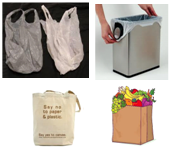13. Two recent studies might end the great grocery bag debate.The debates over which type of grocery bag is best break down into two issues:which are better for the environment,and which are better for your health.
Two recent studies might end the great grocery bag debate.The debates over which type of grocery bag is best break down into two issues:which are better for the environment,and which are better for your health.
The first study focused on the question of cloth bag contamination(传染).It's well-known that supermarkets offer many opportunities for people to pick up contaminated food:other shoppers contaminate shopping carts,and stockroom clerks contaminate containers.When shoppers put such things into cloth bags,they can contaminate the bag,and then wind up contaminating uncontaminated foods on their next shopping trip.Large numbers of bacteria were found in almost all bags.
Washing the bags might help,but researchers found that"reusable bags are seldom washed and often used for different purposes".
The second study should end the"use reusable grocery bags"argument.In the study,researchers evaluated(评估)the bags on a set of environmental standards,including global warming potential.The table below shows how many times that non-HDPE bags must be used in order to bring their global warming potential down to that of an HDPE bag.The first column,for example,shows that a paper bag should be reused three times to reduce its global warming potential to that of an HDPE bag,while you have to use an LDPE bag four times,a non-woven PP bag 11times,and a cotton bag up to 131times to achieve the same end.
So the conclusion seems clear:the traditional,thin plastic bag has better environmental performance and is likely to be quite safer for human health.
72.The researchers in both studies might agree thatC.
A.we should reuse our grocery bags as much as possible
B.cotton bags are environment-friendly when they are reused
C.plastic bags are good for the environment and our health
D.grocery bags,if washed,can reduce global warming potential
73.The underlined phrase"wind up"in Paragraph 2probably meansB.
A.give up B.end up C.pick up D.take up
74.What's the problem with cloth bags according to the first study?A
A.They are easily contaminated when reused.
B.They produce large numbers of bacteria.
C.They are poisonous and can pollute foods.
D.They need washing before being reused.
75.We know from the chart that in terms of reducing the global warming potential,A.
A.if an HDPE bag is used three times,a cotton bag should be used 393times
B.the more times HDPE bags are reused,the greater their global warming potential is
C.LDPE bags,when reused 9times,have a better effect than cotton bags reused 131times
D.non-woven PP bags,though reused 33times,work worse than paper bags reused 7times.
 Two recent studies might end the great grocery bag debate.The debates over which type of grocery bag is best break down into two issues:which are better for the environment,and which are better for your health.
Two recent studies might end the great grocery bag debate.The debates over which type of grocery bag is best break down into two issues:which are better for the environment,and which are better for your health.The first study focused on the question of cloth bag contamination(传染).It's well-known that supermarkets offer many opportunities for people to pick up contaminated food:other shoppers contaminate shopping carts,and stockroom clerks contaminate containers.When shoppers put such things into cloth bags,they can contaminate the bag,and then wind up contaminating uncontaminated foods on their next shopping trip.Large numbers of bacteria were found in almost all bags.
Washing the bags might help,but researchers found that"reusable bags are seldom washed and often used for different purposes".
The second study should end the"use reusable grocery bags"argument.In the study,researchers evaluated(评估)the bags on a set of environmental standards,including global warming potential.The table below shows how many times that non-HDPE bags must be used in order to bring their global warming potential down to that of an HDPE bag.The first column,for example,shows that a paper bag should be reused three times to reduce its global warming potential to that of an HDPE bag,while you have to use an LDPE bag four times,a non-woven PP bag 11times,and a cotton bag up to 131times to achieve the same end.
| Type of carrier | HDPE bag (No secondary reuse) | HDPE bag (40.3% reused as rubbish bags) | HDPE bag (100% reused as rubbish bags) | HDPE bag (Used three times) |
| Paper bag | 3 | 4 | 7 | 9 |
| LDPE bag | 4 | =5 | 9 | 12 |
| Non-woven PP bag | 11 | 14 | 26 | 33 |
| Cotton bag | 131 | 173 | 327 | 393 |
72.The researchers in both studies might agree thatC.
A.we should reuse our grocery bags as much as possible
B.cotton bags are environment-friendly when they are reused
C.plastic bags are good for the environment and our health
D.grocery bags,if washed,can reduce global warming potential
73.The underlined phrase"wind up"in Paragraph 2probably meansB.
A.give up B.end up C.pick up D.take up
74.What's the problem with cloth bags according to the first study?A
A.They are easily contaminated when reused.
B.They produce large numbers of bacteria.
C.They are poisonous and can pollute foods.
D.They need washing before being reused.
75.We know from the chart that in terms of reducing the global warming potential,A.
A.if an HDPE bag is used three times,a cotton bag should be used 393times
B.the more times HDPE bags are reused,the greater their global warming potential is
C.LDPE bags,when reused 9times,have a better effect than cotton bags reused 131times
D.non-woven PP bags,though reused 33times,work worse than paper bags reused 7times.
7. Do we need an"Ivy (常春藤) League"?
Do we need an"Ivy (常春藤) League"?
China may soon have its own"Ivy League",with a union of top universities.
The term originally referred to an athletic conference of eight top universities in the northeastern US.The Chinese version,which was officially started in mid-October,consists of nine famous universities,including Peking,Tsinghua,Zhejiang and Fudan.The union is supposed to result in student exchange programs,recognition of academic achievements,and other joint programs.
The news of this Chinese"Ivy League"has received mixed responses from the public and press.Some negative critics have dismissed it as yet another example of the wishful copying of international practices without fully understanding them.Others say that the"Ivy League"is not necessary but that the union is a good idea,one that could promote academic development.
So what's your opinion on a Chinese"Ivy League"?Do we need one?
Yes.Ivy League or not,nine of China's best universities cooperating is a good thing.
1.These universities combining resources could create a better environment for students and for research.It could also save a lot of time and resources because it would mean fewer unnecessary investments for some of the universities.
2.Allowing students to move to or have exchanges with other universities could broaden their horizons,improve their social skills and create more employment opportunities.The results could be more important than lessons and achievements.
3.The term"Ivy League"carries a sense of academic excellence,tradition and reputation.If borrowing such a term could encourage students'and professors'mental state and improve Chinese higher education,then there's no reason not to do it.
No.Universities should do some work on increasing cooperation instead of copying an"Ivy League"model.
1.Many Chinese universities already have such cooperation with each other.If this cooperation were associated with the"Ivy League",it would just distract (分散) attention and resources and have a negative effect.
2.These Chinese universities are all state-run and most get their funding from the government.They're quite similar to each other in many ways and more cooperation wouldn't bring about as much potential ability as between,say,public and private,or Chinese and foreign universities.
3.China should find its own way to develop world-class universities instead of by copying some foreign practices.We have our own unique conditions and foreign lessons often don't apply well here.
Do we need an"Ivy League"?
0 138114 138122 138128 138132 138138 138140 138144 138150 138152 138158 138164 138168 138170 138174 138180 138182 138188 138192 138194 138198 138200 138204 138206 138208 138209 138210 138212 138213 138214 138216 138218 138222 138224 138228 138230 138234 138240 138242 138248 138252 138254 138258 138264 138270 138272 138278 138282 138284 138290 138294 138300 138308 151629
 Do we need an"Ivy (常春藤) League"?
Do we need an"Ivy (常春藤) League"?China may soon have its own"Ivy League",with a union of top universities.
The term originally referred to an athletic conference of eight top universities in the northeastern US.The Chinese version,which was officially started in mid-October,consists of nine famous universities,including Peking,Tsinghua,Zhejiang and Fudan.The union is supposed to result in student exchange programs,recognition of academic achievements,and other joint programs.
The news of this Chinese"Ivy League"has received mixed responses from the public and press.Some negative critics have dismissed it as yet another example of the wishful copying of international practices without fully understanding them.Others say that the"Ivy League"is not necessary but that the union is a good idea,one that could promote academic development.
So what's your opinion on a Chinese"Ivy League"?Do we need one?
Yes.Ivy League or not,nine of China's best universities cooperating is a good thing.
1.These universities combining resources could create a better environment for students and for research.It could also save a lot of time and resources because it would mean fewer unnecessary investments for some of the universities.
2.Allowing students to move to or have exchanges with other universities could broaden their horizons,improve their social skills and create more employment opportunities.The results could be more important than lessons and achievements.
3.The term"Ivy League"carries a sense of academic excellence,tradition and reputation.If borrowing such a term could encourage students'and professors'mental state and improve Chinese higher education,then there's no reason not to do it.
No.Universities should do some work on increasing cooperation instead of copying an"Ivy League"model.
1.Many Chinese universities already have such cooperation with each other.If this cooperation were associated with the"Ivy League",it would just distract (分散) attention and resources and have a negative effect.
2.These Chinese universities are all state-run and most get their funding from the government.They're quite similar to each other in many ways and more cooperation wouldn't bring about as much potential ability as between,say,public and private,or Chinese and foreign universities.
3.China should find its own way to develop world-class universities instead of by copying some foreign practices.We have our own unique conditions and foreign lessons often don't apply well here.
Do we need an"Ivy League"?
| Ivy in America | It originally referred to an athletic conference of (71)eight top universities in the northeast of America. | ||
Ivy in China | Formation | Nine famous universities | |
(72)Purposes of the union | To exchange students | ||
| To(73)recognize academic achievements | |||
| To work on the joint programs | |||
| (74)Responses from the public | |||
| Positive side | (75)Negative side | ||
| The cooperation is good for the combination of resources and recreation of (76)a better environment. | Attention will be drawn away and (78)resources will be distracted. | ||
| Students will have less difficulty in finding jobs through the student exchange program. | The cooperation won't have great effect because of their (79)similarities in running universities. | ||
| The cooperation will (77)encourage the students and professors mentally. | China should develop world-class universities in its (80)unique way without copying foreign countries blindly. | ||
 From a very early age,some children exhibit better self-control than others.Now,a new study that began with about 1,000children in New Zealand has tracked how a child's low self-control can predict poor health,money troubles and even a criminal record in their adult years.
From a very early age,some children exhibit better self-control than others.Now,a new study that began with about 1,000children in New Zealand has tracked how a child's low self-control can predict poor health,money troubles and even a criminal record in their adult years.